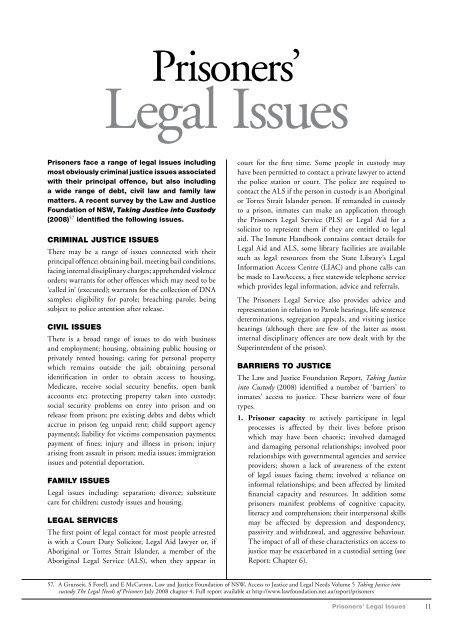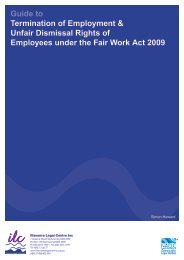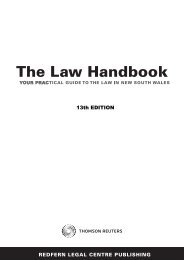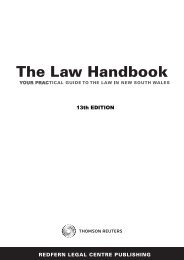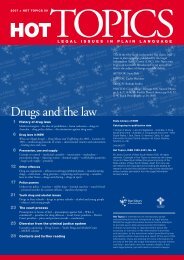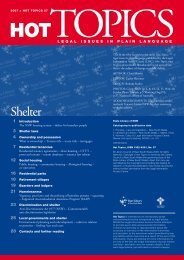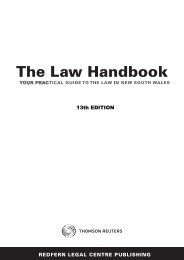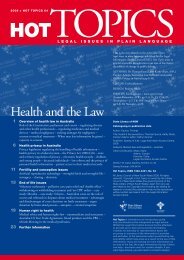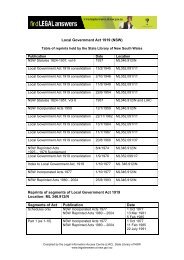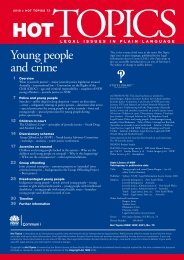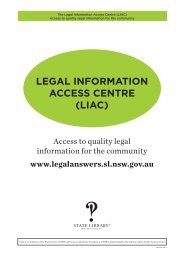Prisoners - Legal Information Access Centre - NSW Government
Prisoners - Legal Information Access Centre - NSW Government
Prisoners - Legal Information Access Centre - NSW Government
You also want an ePaper? Increase the reach of your titles
YUMPU automatically turns print PDFs into web optimized ePapers that Google loves.
<strong>Prisoners</strong>’<br />
<strong>Legal</strong> Issues<br />
prisoners face a range of legal issues including<br />
most obviously criminal justice issues associated<br />
with their principal offence, but also including<br />
a wide range of debt, civil law and family law<br />
matters. a recent survey by the Law and Justice<br />
Foundation of nsW, taking Justice into Custody<br />
(2008) 57 identified the following issues.<br />
criminAl jusTice issues<br />
There may be a range of issues connected with their<br />
principal offence; obtaining bail, meeting bail conditions,<br />
facing internal disciplinary charges; apprehended violence<br />
orders; warrants for other offences which may need to be<br />
‘called in’ (executed); warrants for the collection of DNA<br />
samples; eligibility for parole; breaching parole; being<br />
subject to police attention after release.<br />
civil issues<br />
There is a broad range of issues to do with business<br />
and employment; housing, obtaining public housing or<br />
privately rented housing; caring for personal property<br />
which remains outside the jail; obtaining personal<br />
identification in order to obtain access to housing,<br />
Medicare, receive social security benefits, open bank<br />
accounts etc; protecting property taken into custody;<br />
social security problems on entry into prison and on<br />
release from prison; pre existing debts and debts which<br />
accrue in prison (eg unpaid rent; child support agency<br />
payments); liability for victims compensation payments;<br />
payment of fines; injury and illness in prison; injury<br />
arising from assault in prison; media issues; immigration<br />
issues and potential deportation.<br />
fAmily issues<br />
<strong>Legal</strong> issues including: separation; divorce; substitute<br />
care for children; custody issues and housing.<br />
legAl services<br />
The first point of legal contact for most people arrested<br />
is with a Court Duty Solicitor, <strong>Legal</strong> Aid lawyer or, if<br />
Aboriginal or Torres Strait Islander, a member of the<br />
Aboriginal <strong>Legal</strong> Service (ALS), when they appear in<br />
court for the first time. Some people in custody may<br />
have been permitted to contact a private lawyer to attend<br />
the police station or court. The police are required to<br />
contact the ALS if the person in custody is an Aboriginal<br />
or Torres Strait Islander person. If remanded in custody<br />
to a prison, inmates can make an application through<br />
the <strong>Prisoners</strong> <strong>Legal</strong> Service (PLS) or <strong>Legal</strong> Aid for a<br />
solicitor to represent them if they are entitled to legal<br />
aid. The Inmate Handbook contains contact details for<br />
<strong>Legal</strong> Aid and ALS, some library facilities are available<br />
such as legal resources from the State Library’s <strong>Legal</strong><br />
<strong>Information</strong> <strong>Access</strong> <strong>Centre</strong> (LIAC) and phone calls can<br />
be made to Law<strong>Access</strong>, a free statewide telephone service<br />
which provides legal information, advice and referrals.<br />
The <strong>Prisoners</strong> <strong>Legal</strong> Service also provides advice and<br />
representation in relation to Parole hearings, life sentence<br />
determinations, segregation appeals, and visiting justice<br />
hearings (although there are few of the latter as most<br />
internal disciplinary offences are now dealt with by the<br />
Superintendent of the prison).<br />
BArriers TO jusTice<br />
The Law and Justice Foundation Report, Taking Justice<br />
into Custody (2008) identified a number of ‘barriers’ to<br />
inmates’ access to justice. These barriers were of four<br />
types.<br />
1. Prisoner capacity to actively participate in legal<br />
processes is affected by their lives before prison<br />
which may have been chaotic; involved damaged<br />
and damaging personal relationships; involved poor<br />
relationships with governmental agencies and service<br />
providers; shown a lack of awareness of the extent<br />
of legal issues facing them; involved a reliance on<br />
informal relationships; and been affected by limited<br />
financial capacity and resources. In addition some<br />
prisoners manifest problems of cognitive capacity,<br />
literacy and comprehension; their interpersonal skills<br />
may be affected by depression and despondency,<br />
passivity and withdrawal, and aggressive behaviour.<br />
The impact of all of these characteristics on access to<br />
justice may be exacerbated in a custodial setting (see<br />
Report: Chapter 6).<br />
57. A Grunseit, S Forell, and E McCarron, Law and Justice Foundation of <strong>NSW</strong>, <strong>Access</strong> to Justice and <strong>Legal</strong> Needs Volume 5 Taking Justice into<br />
custody The <strong>Legal</strong> Needs of <strong>Prisoners</strong> July 2008 chapter 4. Full report available at http://www.lawfoundation.net.au/report/prisoners<br />
prisoners’ <strong>Legal</strong> issues 11


